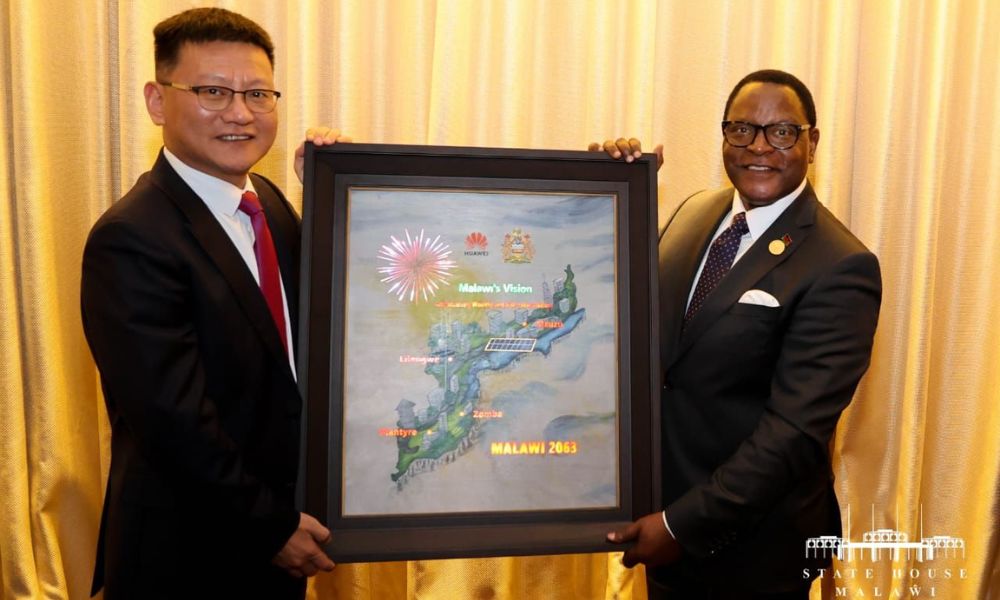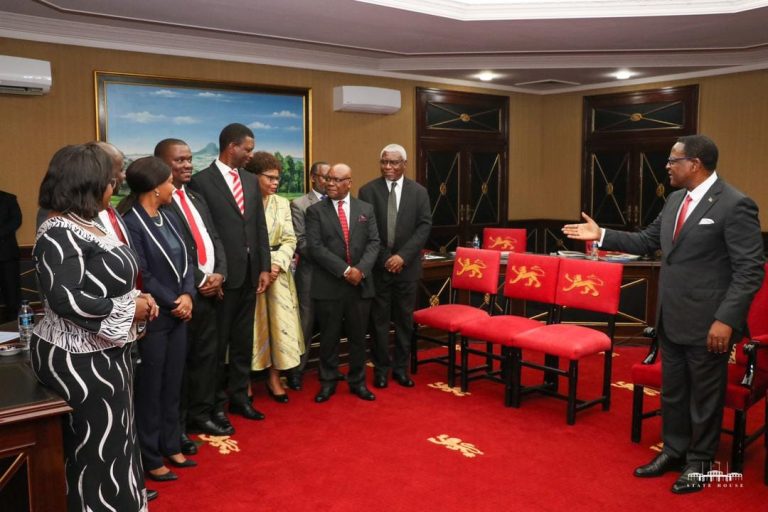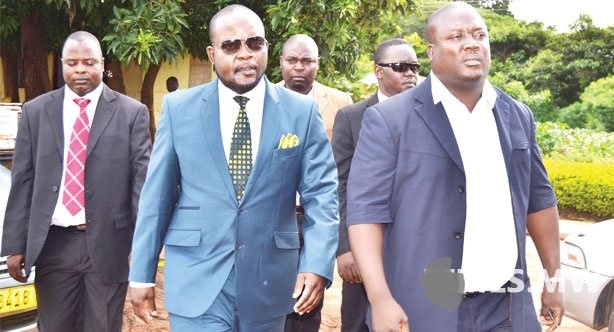Some USD121.8 million was borrowed by two administrations from the Chinese Government to finance the national fiber backbone project–the internet remains faulty, but the big question is, why is the Malawi Government now contracting a Blantyre-registered company to do the same project? Malawi President Lazarus Chakwera at the launch of the second phase of the National Fibre project on June 25, 2021. Photo by Joseph Mizere/Xinhua) JULIUS MBEŴE The government has granted a 13 billion kwacha (USD 8 million) contract to a Blantyre-based company, Huawei Technologies Blantyre Co., Limited for a project that was already twice financed by expensive Chinese government loans raising fears that the fresh deal is aimed at defrauding the state. Both phases 1 and 2 of the National Fibre Backbone Project– which is aimed at improving internet connectivity in the country–were funded by the Chinese government through two separate loans granted by the China Exim Bank and were implemented by a Chinese company, Huawei Technologies Co., Ltd of China, in collaboration with the State-owned Electricity Supply Corporation of Malawi (ESCOM) which deployed the backbone through its power transmission towers. All payments for the project went to their China bank accounts. Two parliament bills backed the project's phases 1 and 2: Bill No. 31 of 2016 [Export and Import Bank of China (National Fibre Backbone Project) Loan (Authorisation)], passed on December 6, 2016, authorizing the government to borrow RMB160 million for the first phase, and Bill No. 21 of 2018 for the second phase. Malawi's Parliament ratified the loan agreement for the first phase on December 6, 2016, through Bill No. 31 of 2016 and the second phase through Bill No. 21 of 2018. According to the ESCOM Integrated Strategic Plan (IPS27), the total loan amount for the first and second phases of the project obtained from the EXIM Bank of China is USD 121.8 million. The loan for the first phase included a 20-year maturity (final maturity date: September 21, 2036), a 6.25-year grace period (first repayment date: March 21, 2022), and a 2 percent interest rate, according to AidData, an organisation that tracks government loans. PIJ has sourced multiple documents on the various phases of the contract of the project, including some accessed through the Access to Information Act (ATIA) request to the Ministry of Information. Analysis of the documents raises several questions about the planned procurement; including question marks on why the government single-sourced the company, why the company preferred is registered in Malawi and not the China-based company that previously handled phases 1 and 2, and why the scope of the work was not included in the main phase 2 which was recently concluded. Analysis of the documents further raises eyebrows over inconsistencies and discrepancies in the identity of the company hired but also the nature of the work it is being hired to conduct including: In some correspondence, the documents show that the government wants to grant a license to a Blantyre-based company known as Huawei Technologies Blantyre Co. Limited to conduct unfinished work for the second phase of the project. In some documents, the government states the same contract is for the whole second phase of the project. The first and second phase of the project was granted to Huawei Technologies Co., Ltd in China. The proposed contract is a Blantyre-based company known as Huawei Technologies Blantyre Co. Limited. Analysis of the first and second phases of the projects shows which districts were covered by the project. The second phase even including designing for the project raises questions on why the project appears to be redoing activities already implemented in phases one and two. Single-sourcing President Lazarus Chakwera launched the second phase of the project at a ceremony in Lilongwe, Malawi, on June 25, 2021, and the project was originally expected to reach completion on June 30, 2022. There was no hint of any remaining extra work only for the government to single-handedly invite Huawei Technologies Blantyre Limited to submit a proposal (quotation) to conduct the remaining activities on the project. The request was made by the Ministry of Information’s Principal Secretary, Baldwin Chiyamwaka on 30th May 2024, (meaning that the company did not even bid for the work nor any tender was announced). In the letter, Chiyamwaka said the previous phase 2 contract had a deficit of USD11 million hence the need for the additional works. That request was followed up by a letter from Huawei Technologies Blantyre Limited on 7th June attached with a quotation. The Public Procurement and Disposal of Authority (PPDA) has approved the proposition granting a no-objection to the single-sourcing procurement following a request made by the Ministry through a letter dated 11 July 2024 (Ref. No. INF/e-GOVT/92). According to the PPDA Circular dated 1st April 2024, all goods above 100 million Kwacha in every government department, agency, or company (including NOCMA) are supposed to be done through Requests for Quotations (RFQs) while procurement between 100 million to 10 billion Kwacha are supposed to be done under National Competitive Bidding (NCB) rules and those above 10 billion Kwacha are expected to be done under the International Competitive Bidding (ICB) rules. The PPDA approved the proposed single-sourcing of the Blantyre-based company after being informed it is the same company based in China. “Kindly be advised that based on the information provided, the Authority has granted its No Objection for you to use single sourcing procurement method to engage Huawei Technologies to complete the remaining activities under the Malawi National Fiber Backbone Project phase II at the total contract amount of USD8,023,707.37 (Eight Million Twenty-Three Thousand Seven Hundred Seven Point Three Seven United States Dollars),” wrote PPDA Director General Eddington Chilapondwa on 22nd August 2024. He added: “This "No Objection' is issued on condition that the resultant contract is entered into within ninety (90) days from the date of issue. Be advised that if the ninety days elapse before the contract is entered into, the procurement process shall have to be restarted. However, if the failure is due to justifiable reasons beyond your control, then you may, before the expiry of the validity period, apply for an extension of the validity of this No Objection.” The PPDA, responding to PIJ's request for information, confirmed it granted the no-objection to the Ministry. The Internal Procurement and Disposal Committee for the Department of E-government and Corporate Office on 27th August 2024 sat and approved the procurement. The meeting was attended by the Director of Administration and IPC Chairperson Loius Chipofya, Chief Accountant Awala Kankhokwe, Deputy Director Planning Bessie Msusa, Principal Administrative Officer Herbert Kashoni, and Assistant Procurement Officer Margaret Mndoli. “The Secretariate briefed the committee that following the No Objection that was granted to the Ministry to engage Huawei Technologies to complete the remaining activities under the Malawi National Fiber Backbone Phase II project a contract was drafted that will be submitted to the Government Contracting Unit for review. “The secretariate presented the drafted contract to the committee and after a lengthy discussion the committee approved the drafted contract and advised the secretariate to proceed with the submission to GCU for vetting,” reads minutes of the IPC meeting. What is the new deal for? The first phase of the fiber backbone project was expected to lay 1,220 km of fiber optic cables from the northern border district of Chitipa to Nsanje in the south, through Lilongwe, Blantyre, and Zomba and connect 24 districts (out of the country's total 28 districts) with drop points at the Capital Hill in Lilongwe, Blantyre Government Office Complex, and Zomba Government's Offices at the District Commissioner's Office. The project was also expected to install communication equipment to enable internet connectivity and help the government integrate and optimize its Integrated Financial Management and Information System (IFMIS), Human Resource Management Information System (HRMIS), and the Immigration and National Registration and Identification System. Ultimately, the first phase of the project aimed at connecting all major sectors of the economy and government agencies in the country to a high-speed optical fiber-based network. The total fiber optic cable network to be covered was 4,000 km. 1,220 km as part of the project while 2,780 km is covered by ESCOM's current network. The second phase targeted nearly 3, 000 kilometres of fibre optic cables. Procedural Integrity? In a written response to PIJ, the Ministry of Information said it was committed to procedural integrity and upholding the highest standards of transparency. “Every step of this process is being conducted in full compliance with the relevant legal and regulatory frameworks to safeguard public interests. We hope this response comprehensively addresses your request and dispels any potential misunderstandings. We kindly urge all stakeholders, including the media, to present the facts accurately and objectively to maintain public trust and avoid unwarranted misinterpretations,” wrote Paul Katema, the Director of E-Government. Officials from Huawei Blantyre Technologies Co. Limited refused to respond to our questions saying they needed permission from the Malawi government. Still paying for past loans Amid all this, indications show that the Malawi government has been struggling to pay back the loan from the Exim Bank. The loan's principal amount outstanding was RMB 155,432,330.40 as of June 2023. “In 2021, Malawi's Minister of Finance announced that ‘in 2020/21 FY, Government [of Malawi] requested temporary debt service suspension from bilateral creditors. This is in line with the Extended Debt Service Suspension Initiative (DSSI). The key feature of the Extended DSSI is that the repayment period of the principal and interest payments falling due between 1st January 2021 to 30th June 2021 will be made in five years with a one-year grace period,” reads correspondence we have seen. Then, in November 2022, the World Bank and the IMF judged the Government of Malawi’s external debt and overall public debt to be ‘in distress’—a downgrade from the previous World Bank-IMF Debt Sustainability Analysis (DSA). In a July 2023 correspondence with AidData, a website tracking public financing globally, the Government of Malawi revealed that it was in negotiations with China Eximbank about rescheduling all of its loans with amounts outstanding. The correspondence shows that Malawi Government proposed principal payments worth RMB 61 million plus interest payments worth RMB 26 million in 2023; interest payments worth RMB 26 million and principal payment deferrals in 2024 and 2025, and RMB 50 million in principal and interest payments in 2026. A further RMB 90 million in principal and interest payments was proposed for 2027, RMB 89 million plus interest in 2028; RMB 88 million in interest payments in 2029, RMB 87 million in principal and interest payments in 2030, RMB 86 million in principal and interest payments in 2031, and RMB 85 million in principal and interest payments in 2032. On the other hand, China Eximbank proposed principal payments worth RMB 61 million and interest payments worth RMB 26 million in 2023, with interest payments worth RMB 26 million and principal payment deferrals in 2024 and 2025, RMB 148 million in principal and interest payments in 2026, RMB 299 million in principal and interest payments in 2027, RMB 294 million in principal and interest payments in 2028, RMB 228 million in principal and interest payments in 2029, RMB 121 million in principal and interest payments in 2030, RMB 101 million in principal and interest payments in 2031, and RMB 82 million in principal and interest payments in 2032. As of July 2023, a debt rescheduling deal had not yet been reached by the parties. The Malawian taxpayer will pay for the loans, for a very long time. ……………………………………………………………………………………. This article was produced by the Platform for Investigative Journalism (PIJ), an independent centre for investigative journalism. PIJ is committed to professional and ethical journalism.








